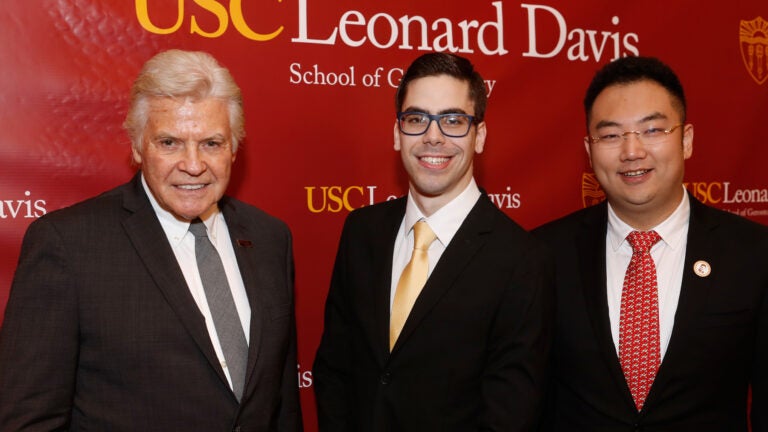
David Markovich, center, who recovered from a neurological disorder, with George Shannon and Kevin Xu (Photo/Steve Cohn)
Trojan turns temporary paralysis into innovation for older adults
$20,000 award from alumni supporters enables student to develop product that will help aging and disabled people stand
In 2014, David Markovich chalked up a tingling sensation in his legs and pain in his lower back to nothing more than signs of being tired.
But in a matter of hours, he lost the ability to walk. It wasn’t due to an accident or injury but rather a rare condition called acute transverse myelitis, a neurological disorder caused by inflammation in sections of the spinal cord. While the temporary condition became an unexpected obstacle, his experience offered an insight to the challenges older adults and people with disabilities encounter daily.
Markovich, now pursuing dual master’s degrees in gerontology and health administration through a joint program between the USC Leonard Davis School of Gerontology and the USC Price School of Public Policy, used his experience to submit a product idea for USC Davis’ first Brighten Award for Entrepreneurial Gerontology. His concept, the ShowerBalance System, yielded a $20,000 grant award to develop his product that could help improve the lives of older adults and their families.
The Brighten Award for Entrepreneurial Gerontology was established by Kevin Xu ’11 and his wife, Leah Yang MA ’13. It is designed to inspire and support USC Davis students to create new products and services that can improve the lives of older people and their families.
Working toward recovery
After Markovich’s life was disrupted in early 2014, he spent the next five months trying to recover from his paralysis with the help of physicians and physical therapy. But through his progress, he struggled with new limitations.
“I was frustrated by the fact that it was very difficult for me to take a shower,” he said. “When I first started gaining movement and feeling [again], I would use something in the bathroom to hold myself up.”
Being able to stand and move around the bathroom was therapeutic and empowering. Not only was it a form of physical therapy for his muscles, but he said the ability to stand instilled a sense of confidence and an ability to return to his routine.
Showered with blessings
Preparing to enter the Brighten competition, Markovich reflected on the toughest challenges he faced during his 2014 experience and promptly thought of the shower. The insight led to his creation of the ShowerBalanceSystem, a portable all-encompassing device made to provide standing support primarily in the shower, but adaptable to other areas of the home.
Compared to his device, Markovich said other products addressing these issues only provide single-sided support and are not adjustable for other members in a household.
“I’m very honored to receive the award, and I’m very grateful for Mr. and Mrs. Xu’s contributions to the school, including this award which will help me tremendously in the development of my product,” Markovich said.
The product is currently pending patent approval. Once he receives the funding, Markovich hopes to start work under the supervision of faculty adviser George Shannon, holder of the Kevin Xu Chair in Gerontology and professor at USC Davis.
This product offers exactly the kind of innovation we hoped to inspire with the Brighten Award.
Kevin Xu
“This product offers exactly the kind of innovation we hoped to inspire with the Brighten Award,” Xu said. “We look forward to seeing how the ShowerBalanceSystem and other entrepreneurial products and services can redefine the future of aging.”
Future aspirations
While Markovich’s experience influenced the concept for his product, pursuing a career in gerontology stems from the relationship with his grandfather and his time as a volunteer at a local senior center.
“I’ve wanted to make a significant difference prior to being struck with this condition, but through this device, I now have an outlet to do that,” he said.
Following the completion of his studies, Markovich hopes to develop the product and put it out on the market for older adults, disabled people and others who could benefit from it.
